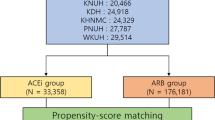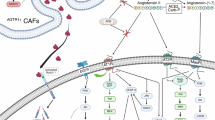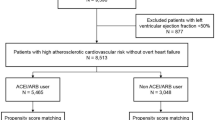Abstract
Cardiotoxicity is a growing concern in cancer patients receiving chemotherapy. Renin–angiotensin system (RAS) inhibitors, including angiotensin-converting enzyme (ACE) inhibitors and angiotensin receptor blockers (ARBs), are widely used for cardiovascular protection, but their role in cancer care remains uncertain. We conducted a systematic review and meta-analysis of randomized controlled trials (RCTs) to evaluate the effects of RAS inhibitors on cardiotoxicity, dyspnea, and quality of life (QOL) in patients with malignancies. A comprehensive literature search was performed using PubMed, Embase, Web of Science, and the Cochrane Library, from which 15 eligible RCTs were identified. These trials compared RAS inhibitor users and non-users. Group differences were analyzed using mean differences (MDs) or odds ratios (ORs), with heterogeneity assessed by the I² statistic. Pooled results suggested a possible association between RAS inhibitor use and higher left ventricular ejection fraction (LVEF) compared to controls (MD 4.42%, 95% CI –0.02 to 8.85; I² = 96%). Subgroup analysis revealed significant benefit in patients receiving HER2-targeted therapy and those undergoing non-specific chemotherapy, while no advantage was seen in patients treated with anthracyclines and HER2 blockade. RAS inhibitors showed limited benefit in anthracycline regimens. No significant reduction in cardiotoxicity was observed (OR 0.66, 95% CI 0.19–2.30). Additionally, two trials evaluating ACE inhibitors with beta-blockers demonstrated additive effects in preventing LVEF decline in high-risk populations. One trial also reported improved dyspnea with ACE inhibitors in lung cancer. RAS inhibitors may help preserve cardiac function in cancer patients, but current evidence is inconclusive. Confirmation through large-scale RCTs is warranted.

This is a preview of subscription content, access via your institution
Access options
Subscribe to this journal
Receive 12 print issues and online access
$259.00 per year
only $21.58 per issue
Buy this article
- Purchase on SpringerLink
- Instant access to the full article PDF.
USD 39.95
Prices may be subject to local taxes which are calculated during checkout





Similar content being viewed by others
Data availability
The authors declare that all supporting data are available within the article and its Supplemental Material.
References
Sturgeon KM, Deng L, Bluethmann SM, Zhou S, Trifiletti DM, Jiang C, et al. A population-based study of cardiovascular disease mortality risk in US cancer patients. Eur Heart J. 2019;40:3889–97.
Ewer MS, Ewer SM. Cardiotoxicity of anticancer treatments: what the cardiologist needs to know. Nat Rev Cardiol. 2010;7:564–75.
Curigliano G, Cardinale D, Dent S, Criscitiello C, Aseyev O, Lenihan D, et al. Cardiotoxicity of anticancer treatments: Epidemiology, detection, and management. CA Cancer J Clin. 2016;66:309–25.
Stone JR, Kanneganti R, Abbasi M, Akhtari M. Monitoring for Chemotherapy-Related Cardiotoxicity in the Form of Left Ventricular Systolic Dysfunction: A Review of Current Recommendations. JCO Oncol Pr. 2021;17:228–36.
Lyon AR, López-Fernández T, Couch LS, Asteggiano R, Aznar MC, Bergler-Klein J, et al. 2022 ESC Guidelines on cardio-oncology developed in collaboration with the European Hematology Association (EHA), the European Society for Therapeutic Radiology and Oncology (ESTRO) and the International Cardio-Oncology Society (IC-OS). Eur Heart J. 2022;43:4229–361.
Yano S. Onco-cardiology Guideline-Trends in Japan. Gan Kagaku Ryoho. 2023;50:943–9.
Page MJ, McKenzie JE, Bossuyt PM, Boutron I, Hoffmann TC, Mulrow CD, et al. The PRISMA 2020 statement: an updated guideline for reporting systematic reviews. BMJ. 2021;372:n71.
Center UMIN. UMIN Clinical Trials Registry (UMIN-CTR). https://www.umin.ac.jp/ctr/ctr_regist.htm. Accessed March 10 2025.
Higgins JP, Altman DG, Gøtzsche PC, Jüni P, Moher D, Oxman AD, et al. Cochrane Bias Methods Group; Cochrane Statistical Methods Group. The Cochrane Collaboration’s tool for assessing risk of bias in randomised trials. BMJ. 2011;343:d5928.
Georgakopoulos P, Roussou P, Matsakas E, Karavidas A, Anagnostopoulos N, Marinakis T, et al. Cardioprotective effect of metoprolol and enalapril in doxorubicin-treated lymphoma patients: a prospective, parallel-group, randomized, controlled study with 36-month follow-up. Am J Hematol. 2010;85:894–6.
Georgakopoulos P, Kyriakidis M, Perpinia A, Karavidas A, Zimeras S, Mamalis N, et al. The Role of Metoprolol and Enalapril in the Prevention of Doxorubicin-induced Cardiotoxicity in Lymphoma Patients. Anticancer Res. 2019;39:5703–7.
Gulati G, Heck SL, Ree AH, Hoffmann P, Schulz-Menger J, Fagerland MW, et al. Prevention of cardiac dysfunction during adjuvant breast cancer therapy (PRADA): a 2 × 2 factorial, randomized, placebo-controlled, double-blind clinical trial of candesartan and metoprolol. Eur Heart J. 2016;37:1671–80.
Heck SL, Mecinaj A, Ree AH, Hoffmann P, Schulz-Menger J, Fagerland MW, et al. Prevention of Cardiac Dysfunction During Adjuvant Breast Cancer Therapy (PRADA): Extended Follow-Up of a 2 × 2 Factorial, Randomized, Placebo-Controlled, Double-Blind Clinical Trial of Candesartan and Metoprolol. Circulation. 2021;143:2431–40.
Słowik A, Jagielski P, Potocki P, Streb J, Ochenduszko S, Wysocki P, et al. Anthracycline-induced cardiotoxicity prevention with angiotensin-converting enzyme inhibitor ramipril in women with low-risk breast cancer: results of a prospective randomized study. Kardiol Pol. 2020;78:131–7.
Janbabai G, Nabati M, Faghihinia M, Azizi S, Borhani S, Yazdani J. Effect of Enalapril on Preventing Anthracycline-Induced Cardiomyopathy. Cardiovasc Toxicol. 2017;17:130–9.
Cadeddu C, Piras A, Mantovani G, Deidda M, Dessì M, Madeddu C, et al. Protective effects of the angiotensin II receptor blocker telmisartan on epirubicin-induced inflammation, oxidative stress, and early ventricular impairment. Am Heart J. 2010;160:487.e1–7.
Dessì M, Piras A, Madeddu C, Cadeddu C, Deidda M, Massa E, et al. Long-term protective effects of the angiotensin receptor blocker telmisartan on epirubicin-induced inflammation, oxidative stress and myocardial dysfunction. Exp Ther Med. 2011;2:1003–9.
Pituskin E, Mackey JR, Koshman S, Jassal D, Pitz M, Haykowsky MJ, et al. Multidisciplinary Approach to Novel Therapies in Cardio-Oncology Research (MANTICORE 101-Breast): A Randomized Trial for the Prevention of Trastuzumab-Associated Cardiotoxicity. J Clin Oncol. 2017;35:870–7.
Guglin M, Krischer J, Tamura R, Fink A, Bello-Matricaria L, McCaskill-Stevens W, et al. Randomized Trial of Lisinopril Versus Carvedilol to Prevent Trastuzumab Cardiotoxicity in Patients With Breast Cancer. J Am Coll Cardiol. 2019;73:2859–68.
Boekhout AH, Gietema JA, Milojkovic Kerklaan B, van Werkhoven ED, Altena R, Honkoop A, et al. Angiotensin II-Receptor Inhibition With Candesartan to Prevent Trastuzumab-Related Cardiotoxic Effects in Patients With Early Breast Cancer: A Randomized Clinical Trial. JAMA Oncol. 2016;2:1030–7.
Cardinale D, Colombo A, Sandri MT, Lamantia G, Colombo N, Civelli M, et al. Prevention of high-dose chemotherapy-induced cardiotoxicity in high-risk patients by angiotensin-converting enzyme inhibition. Circulation. 2006;114:2474–81.
Dehghani M, Mirzaie M, Farhadi P, Rezvani A. The Effect of ACE Inhibitor on the Quality of Life amongst Patients with Cancer Cachexia. Asian Pac J Cancer Prev. 2020;21:325–30.
Sio TT, Atherton PJ, Pederson LD, Zhen WK, Mutter RW, Garces YI, et al. Daily Lisinopril vs Placebo for Prevention of Chemoradiation-Induced Pulmonary Distress in Patients With Lung Cancer (Alliance MC1221): A Pilot Double-Blind Randomized Trial. Int J Radiat Oncol Biol Phys. 2019;103:686–96.
Small W, James JL, Moore TD, Fintel DJ, Lutz ST, Movsas B, et al. Utility of the ACE Inhibitor Captopril in Mitigating Radiation-associated Pulmonary Toxicity in Lung Cancer: Results From NRG Oncology RTOG 0123. Am J Clin Oncol. 2018;41:396–401.
Bosch X, Rovira M, Sitges M, Domènech A, Ortiz-Pérez JT, de Caralt TM, et al. Enalapril and carvedilol for preventing chemotherapy-induced left ventricular systolic dysfunction in patients with malignant hemopathies: the OVERCOME trial (preventiOn of left Ventricular dysfunction with Enalapril and caRvedilol in patients submitted to intensive ChemOtherapy for the treatment of Malignant hEmopathies). J Am Coll Cardiol. 2013;61:2355–62.
Wihandono A, Azhar Y, Abdurahman M, Hidayat S. The Role of Lisinopril and Bisoprolol to Prevent Anthracycline Induced Cardiotoxicity in Locally Advanced Breast Cancer Patients. Asian Pac J Cancer Prev. 2021;22:2847–53.
Fang K, Zhang Y, Liu W, He C. Effects of angiotensin-converting enzyme inhibitor/angiotensin receptor blocker use on cancer therapy-related cardiac dysfunction: a meta-analysis of randomized controlled trials. Heart Fail Rev. 2021;26:101–9.
Swain SM, Whaley FS, Ewer MS. Congestive heart failure in patients treated with doxorubicin: a retrospective analysis of three trials. Cancer. 2003;97:2869–79.
Lee M, Chung WB, Lee JE, Park CS, Park WC, Song BJ, et al. Candesartan and carvedilol for primary prevention of subclinical cardiotoxicity in breast cancer patients without a cardiovascular risk treated with doxorubicin. Cancer Med. 2021;10:3964–73.
Motta M, Russo C, Vacante M, Liardo RL, Reitano F, Cammalleri L, et al. Losartan vs. amlodipine treatment in elderly oncologic hypertensive patients: a randomized clinical trial. Arch Gerontol Geriatr. 2011;53:60–3.
Hashemi Jazi SM, Tayebi F, Teimouri-Jervekani Z, Mokarian F, Mehrzad V, Sadeghi A. Comparative Evaluation of Captopril, Spironolactone, and Carvedilol Effect on Endothelial Function in Breast Cancer Women Undergoing Chemotherapy. Adv Biomed Res. 2023;12:116.
Acknowledgements
We would like to thank the Japanese Society of Hypertension (JSH) working group “Onco-Hypertension” for advice on preparing this manuscript.
Japanese Society of Hypertension (JSH) working group “Onco-Hypertension”
Akira Nishiyama7, Mikio Mukai9, Satoshi Morimoto10, Yoshikiyo Ono11, Hidehiro Kaneko12,13, Satoshi Kidoguchi14, Naoki Sugano14, Kunihiro Nishimura15, Yoichi Nozato16, Koichi Node8, Shintaro Minegishi1, Yuichiro Yano5,6.
Author information
Authors and Affiliations
Consortia
Corresponding author
Ethics declarations
Conflict of interest
Mikio Mukai has received speaking honoraria from Daiichi Sankyo and Ferring Pharmaceuticals.
Additional information
Publisher’s note Springer Nature remains neutral with regard to jurisdictional claims in published maps and institutional affiliations.
Supplementary information
Rights and permissions
Springer Nature or its licensor (e.g. a society or other partner) holds exclusive rights to this article under a publishing agreement with the author(s) or other rightsholder(s); author self-archiving of the accepted manuscript version of this article is solely governed by the terms of such publishing agreement and applicable law.
About this article
Cite this article
Ishii, S., Hanajima, Y., Komura, N. et al. Effects of renin–angiotensin system inhibitors in cancer patients: a systematic review and meta-analysis of randomized controlled trials. Hypertens Res 48, 3257–3267 (2025). https://doi.org/10.1038/s41440-025-02402-w
Received:
Revised:
Accepted:
Published:
Version of record:
Issue date:
DOI: https://doi.org/10.1038/s41440-025-02402-w



